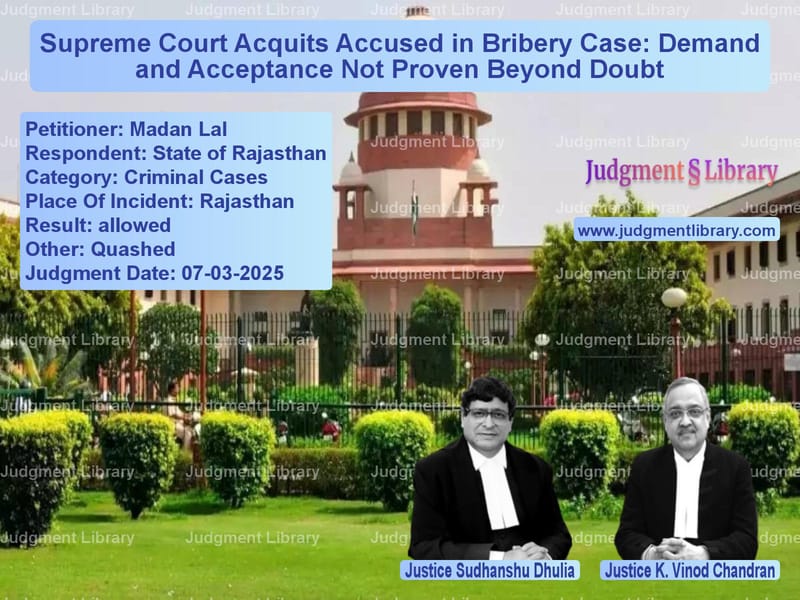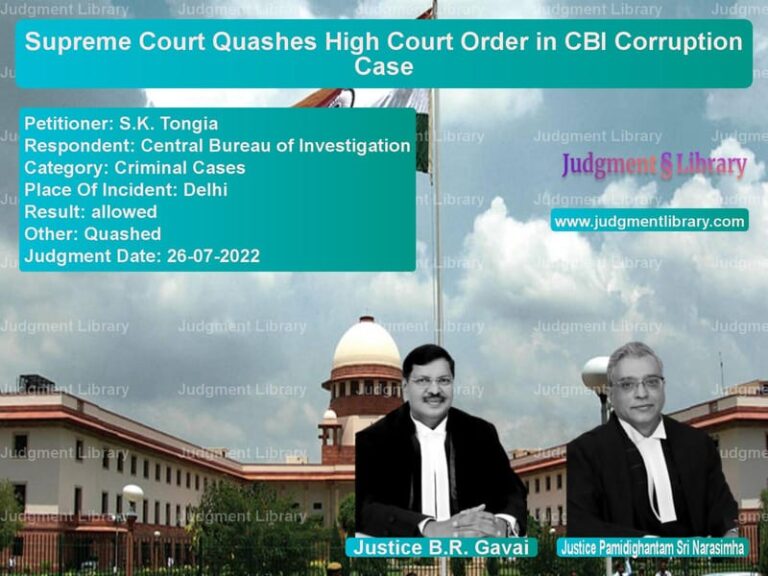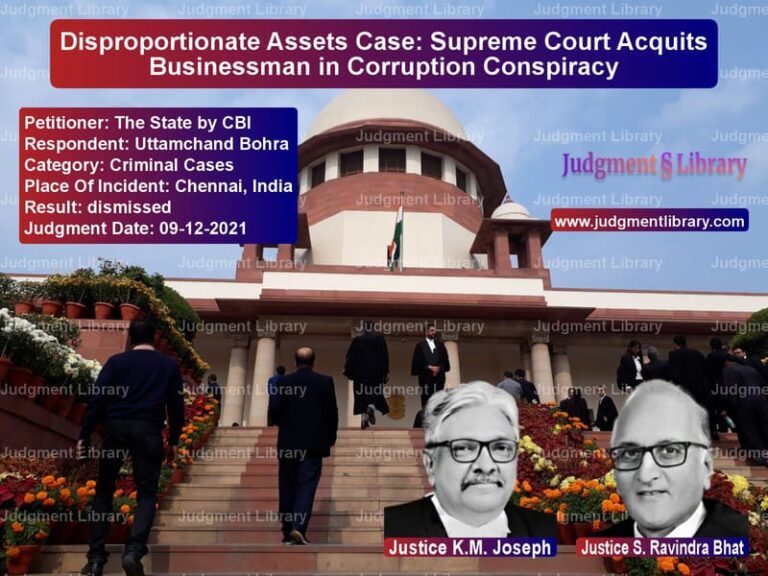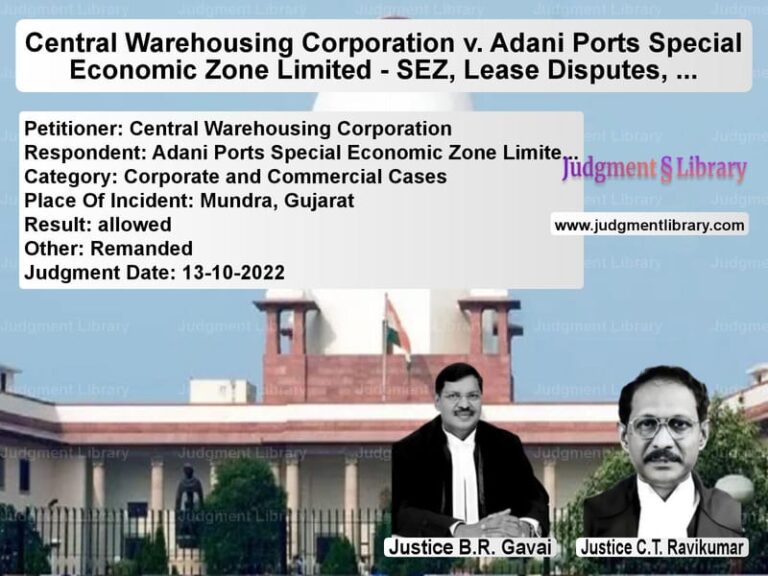Supreme Court Acquits Accused in Bribery Case: Demand and Acceptance Not Proven Beyond Doubt
The Supreme Court of India recently delivered a critical judgment in Madan Lal v. State of Rajasthan, setting aside the conviction of two government officials accused of bribery under the Prevention of Corruption Act, 1988. The Court ruled that the prosecution failed to establish beyond reasonable doubt that the accused had demanded and accepted a bribe. This ruling reaffirms the principle that mere possession of tainted money is insufficient to convict an individual of corruption unless the prosecution can prove demand and acceptance beyond doubt.
Background of the Case
The case originated from a complaint filed by PW 5, who had applied for a Rajasthan Trade Authority License (RTAL) at the District Supply Office, Sri Ganganagar. The complainant alleged that two accused, Madan Lal (Enforcement Inspector) and Narendra Kumar (Office Assistant), had demanded a bribe to process his application.
Key Allegations:
- The complainant claimed that Madan Lal, during an inspection of his shop, demanded a bribe to expedite the issuance of the license.
- The next day, the complainant met both accused at the District Supply Office, where Narendra Kumar allegedly demanded a bribe of ₹500, of which ₹300 was for himself and ₹200 for Madan Lal.
- PW 5 paid the official fee of ₹1000 but, unwilling to pay a bribe, approached the Anti-Corruption Bureau (ACB), which laid a trap.
The ACB’s trap operation led to the arrest of the accused. The prosecution built its case on the complainant’s allegations, the trap proceedings, and forensic tests that confirmed traces of the tainted money on the accused’s hands and clothes.
Trial and High Court Decisions
The Trial Court convicted both accused under:
- Section 7(2) of the Prevention of Corruption Act – for accepting illegal gratification.
- Section 13(1)(d) read with Section 13(2) of the Act – for criminal misconduct.
They were sentenced to:
- 1 year of rigorous imprisonment under Section 13(1)(d), along with a fine of ₹1000.
- 6 months of rigorous imprisonment under Section 7(2), along with a fine of ₹1000.
The Rajasthan High Court upheld the convictions, leading to an appeal in the Supreme Court.
Petitioners’ (Accused) Arguments
The accused challenged their convictions on the following grounds:
- The prosecution failed to prove the demand for a bribe, which is a necessary ingredient for conviction under the Prevention of Corruption Act.
- The complainant’s statements were inconsistent and differed significantly from his original complaint.
- Independent witnesses turned hostile and did not support the prosecution’s version of events.
- The accused claimed that the money was forcibly thrust upon them during a scuffle and that they had no intention of accepting it.
- The forensic test, which found traces of tainted money on their clothes and hands, was unreliable because it was not properly corroborated by independent evidence.
Respondent’s (State of Rajasthan’s) Arguments
The prosecution defended the conviction, arguing that:
- The trap operation successfully caught the accused red-handed.
- The complainant’s allegations were consistent with the forensic evidence, which confirmed that the tainted money was in the possession of the accused.
- The accused failed to provide a plausible explanation for the presence of tainted money on their hands and clothes.
- Under Section 20 of the Prevention of Corruption Act, a presumption of guilt arises when an accused is found in possession of bribe money, and it was their duty to rebut this presumption.
Supreme Court’s Analysis
1. Demand for Bribe Not Established
“There are glaring inconsistencies in the complainant’s statements regarding the amount of money demanded. The prosecution has failed to establish beyond reasonable doubt that there was any demand for a bribe by the accused.”
The Court held that demand is the sine qua non (essential requirement) for a conviction under the Prevention of Corruption Act. If demand is not proven, mere recovery of tainted money is insufficient to convict.
2. Independent Witnesses Did Not Support Prosecution
The Court noted that independent witnesses (PWs 1 and 2) turned hostile and did not corroborate the prosecution’s claim that the accused accepted the bribe.
3. Discrepancies in the Trap Proceedings
The Supreme Court found inconsistencies in the trap operation:
- PWs 1 and 2, the independent witnesses accompanying the trap team, did not see the accused physically receiving the money.
- The prosecution’s claim that the accused voluntarily accepted the bribe contradicted statements from independent witnesses.
- There was no evidence to show that the accused had demanded or accepted money before the ACB team entered the room.
4. Presumption Under Section 20 Not Applicable
“The presumption under Section 20 of the Act does not arise when the prosecution has failed to establish demand beyond reasonable doubt.”
The Court clarified that the presumption of guilt under Section 20 applies only when there is independent proof of demand. Since the prosecution could not prove demand, the presumption did not apply.
Final Judgment
The Supreme Court set aside the conviction, ruling:
“The prosecution has failed to establish and prove the allegation of demand and acceptance of bribe beyond reasonable doubt. Accordingly, the appeals stand allowed, and the accused are acquitted.”
The Court also canceled the bail bonds executed by the accused.
Implications of the Judgment
- Reaffirmation of Legal Principles: The ruling strengthens the legal requirement that mere possession of tainted money is not enough for a conviction; demand must be established.
- Protection for Public Servants: The judgment ensures that officials are not wrongfully convicted based on flawed trap operations.
- Higher Standard of Proof: The ruling raises the bar for proving corruption cases, requiring independent corroboration of demand.
Conclusion
The Supreme Court’s ruling in this case reinforces an essential legal principle: demand for a bribe must be proven beyond reasonable doubt before an accused can be convicted under the Prevention of Corruption Act. By acquitting the accused, the Court has ensured that convictions are based on concrete evidence rather than presumptions or inconsistent witness statements. This decision will serve as an important precedent in corruption-related cases across India.
Petitioner Name: Madan Lal.Respondent Name: State of Rajasthan.Judgment By: Justice Sudhanshu Dhulia, Justice K. Vinod Chandran.Place Of Incident: Rajasthan.Judgment Date: 07-03-2025.
Don’t miss out on the full details! Download the complete judgment in PDF format below and gain valuable insights instantly!
Download Judgment: madan-lal-vs-state-of-rajasthan-supreme-court-of-india-judgment-dated-07-03-2025.pdf
Directly Download Judgment: Directly download this Judgment
See all petitions in Bail and Anticipatory Bail
See all petitions in Fraud and Forgery
See all petitions in Money Laundering Cases
See all petitions in Judgment by Sudhanshu Dhulia
See all petitions in Judgment by K. Vinod Chandran
See all petitions in allowed
See all petitions in Quashed
See all petitions in supreme court of India judgments March 2025
See all petitions in 2025 judgments
See all posts in Criminal Cases Category
See all allowed petitions in Criminal Cases Category
See all Dismissed petitions in Criminal Cases Category
See all partially allowed petitions in Criminal Cases Category







